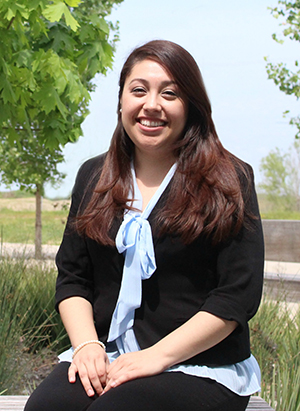
 Doctoral student Patricia Cabral, who studies adolescent health risk behaviors in the Psychological Sciences graduate group, recently won a highly-competitive Ford Foundation Predoctoral Fellowship — the first of its kind awarded to a UC Merced graduate student.
Doctoral student Patricia Cabral, who studies adolescent health risk behaviors in the Psychological Sciences graduate group, recently won a highly-competitive Ford Foundation Predoctoral Fellowship — the first of its kind awarded to a UC Merced graduate student.
The $72,000 fellowship will fund three years of research that could eventually have direct effects on the Latino youth of the San Joaquin Valley and beyond.
Cabral researches sexual activity and drug, alcohol and tobacco use in first-, second- and third-generation Latino youth. She’s specifically interested in how factors such as gender norms, parental monitoring, neighborhood quality and traditional Latino cultural values like familismo — which emphasizes family unity — influence the likelihood that youth will engage in these health risk behaviors (HRBs).
“Patty’s research is particularly timely and significant in California, where 50 percent of all children are Latino,” said Professor Jan Wallander, Cabral’s advisor. “Though youth of all different backgrounds may behave in ways that can have impacts on their health — such as engaging in early, unprotected sex — it is especially important for Latino youth to understand how their heritage influences such behavior.”
Cabral also recently won a competitive $3,000 One Health Student Summer Research fellowship from the UC Global Health Institute Center of Expertise for Migration and Health — one of only four such fellowships awarded among all 10 campuses.
She was presenting a paper on similar research at the annual meeting of the Society of Behavioral Medicine when she got the news about the Ford fellowship. Cabral — herself a second-generation Latina and a first-generation student — appreciates that her work is garnering this kind of attention.
“I am honored to be the recipient of these awards, but equally thrilled that these fine institutions are funding such important research,” Cabral said.






